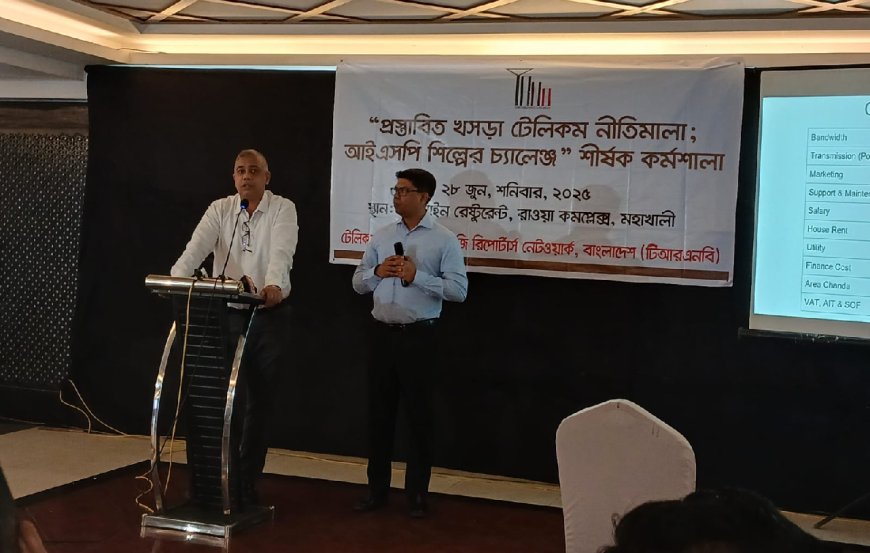Policy Paradox: ISP Leaders Slam Draft Telecom Guideline for Contradictions and Crisis

The Internet Service Providers Association of Bangladesh (ISPAB) has termed the proposed draft telecom policy as the most contradictory and policy-challenged framework in the past 27 years, stating it has stirred confusion, debate, and uncertainty in the sector. ISPAB President Aminul Hakim made these remarks while addressing a workshop held on Saturday, June 28, at the RAOWA Complex in Mohakhali, Dhaka, organized by the Telecom and Technology Reporters Network, Bangladesh (TRNB).
Hakim said, “Providing the best internet service at the lowest price is not realistic. This has turned into a form of populist politics. Private companies cannot reduce prices unless the government offers concessions.” He added, “The government takes 60 percent of revenue from ISPs, so it is impossible to ensure affordable high-speed internet. The government does not want to make concessions, but expects us to do so. How is that feasible? Still, we want to provide good internet at low prices, and for that, we need a good policy.”
Despite regulatory pressure from the Bangladesh Telecommunication Regulatory Commission (BTRC) to reduce internet prices to BDT 400, the ISPAB President made it clear that operators cannot bear the consequences of such enforcement.
At the workshop titled “Proposed Draft Telecom Policy: Challenges to the ISP Industry”, ISPAB’s former president Abdus Salam alleged that even within BTRC, mobile operators are conducting negative campaigns against ISPs. “The draft policy lacks protection for domestic investors and instead appears to favor foreign companies. Every telecom license is now under threat,” he said.
TRNB President Samir Kumar Dey moderated the session, where General Secretary Masuduzzaman Robin delivered the welcome remarks. They explained that the workshop aimed to ensure consumer-level service excellence and protection of local enterprises. “The government has taken note of the concerns. With collective input from stakeholders, TRNB will submit a practical policy proposal for national interest,” they said.
Highlighting regulatory inconsistency, the TRNB President added, “When questioned about undersea cable use by Starlink, the Prime Minister's Special Assistant did not provide a direct response but hinted at another satellite-based service from France entering the market soon.”
ISP General Secretary Nazmul Karim Bhuiyan noted, “Due to a lack of active infrastructure sharing, we’re wasting massive resources. However, we’ve created a 1 Gbps common backbone in Dhanmondi, enabling 77 ISPs to deliver seamless high-speed service—a national example.”
Former President Imdadul Haque urged the government to refrain from frequently changing policies.
Illustrating cost breakdowns, ISP operator Mobarak Hossain explained, “Of the BDT 500 paid by a customer for internet service, BDT 200 goes directly to government revenue. This makes it unreasonable for the government to expect price cuts while reducing transmission costs by only 18-20 percent. It’s mere populism.” He also pointed to invisible extortion from local housing authorities such as those in Bashundhara and Niketan, remarking, “We are expected to provide Mercedes-Benz-level service at auto-rickshaw prices.”
Hossain further said that despite foreign companies being permitted to charge premium rates, domestic firms are being pushed to reduce prices. “If active infrastructure sharing were allowed, customers would benefit by 70 percent. The tangled mess of overhead wires was created by poor government policy. Now, ISPs are being unfairly blamed for substandard services due to that policy tangle,” he lamented.









































































































































































































